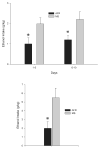Genetic and environmental influences on ethanol consumption: perspectives from preclinical research
- PMID: 20374217
- PMCID: PMC4404761
- DOI: 10.1111/j.1530-0277.2010.01172.x
Genetic and environmental influences on ethanol consumption: perspectives from preclinical research
Abstract
Background: Alcohol use disorders (abuse and dependence, AUD) are multifactorial phenomena, depending on the interplay of environmental and genetic variables.
Method: This review describes current developments in animal research that may help (a) develop gene therapies for the treatment of alcoholism, (b) understand the permissive role of stress on ethanol intake, and (c) elucidate why exposure to ethanol early in life is associated with a greater risk of AUD.
Results: The polymorphisms found in liver alcohol dehydrogenase (ADH) and aldehyde dehydrogenase (ALDH) affect the elimination of ethanol and the susceptibility to ethanol intake. A highly active ADH protects against alcoholism, an effect related to a presteady state burst in arterial acetaldehyde. Social stressors, such as repeated early maternal separation or social defeat, exert a permissive effect on ethanol intake, perhaps by altering the normal development of the hypothalamic-pituitary-adrenal axis. Ethanol exposure during gestation, infancy, or adolescence increases the likelihood of AUD later in life. Early perception of ethanol's positive and negative (anti-anxiety) reinforcing effects may play a role in this phenomenon.
Conclusions: The review underscores the advantages of using preclinical animal models of AUD and highlights points of intersection between the topics to help design a more integrated approach for the study of alcohol-related problems.
Figures


References
-
- Abate P, Pepino M, Dominguez H, Spear N, Molina J. Fetal associative learning mediated through maternal alcohol intoxication. Alcohol Clin Exp Res. 2000;24:39–47. - PubMed
-
- Abate P, Pepino M, Spear N, Molina J. Fetal learning with ethanol: correlations between maternal hypothermia during pregnancy and neonatal responsiveness to chemosensory cues of the drug. Alcohol Clin Exp Res. 2004;28:805–815. - PubMed
-
- Araujo NP, Camarini R, Souza-Formigoni MLO, Carvalho RC, Ablio VC, Silva RH, Ricardo VP, Ribeiro RdA, Frussa-Filho R. The importance of housing conditions on behavioral sensitization and tolerance to ethanol. Pharmacol Biochem Behav. 2005;82:40–45. - PubMed
-
- Arolfo MP, Overstreet DH, Yao L, Fan P, Lawrence AJ, Tao G, Keung W-M, Vallee BL, Olive MF, Gass JT, Rubin E, Anni H, Hodge CW, Besheer J, Zablocki J, Leung K, Blackburn BK, Lange LG, Diamond I. Suppression of heavy drinking and alcohol seeking by a selective ALDH-2 inhibitor. Alcohol Clin Exp Res. 2009;33:1–10. - PMC - PubMed
Publication types
MeSH terms
Grants and funding
LinkOut - more resources
Full Text Sources
Medical

